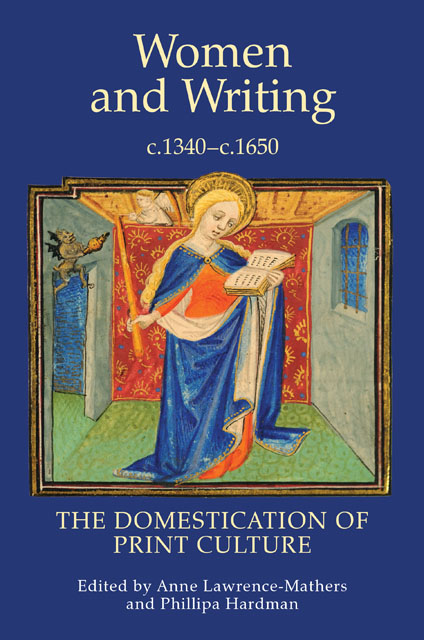Book contents
- Frontmatter
- Contents
- List of Plates
- List of Contributors
- Abbreviations
- Introduction
- Domestic Learning and Teaching: Investigating Evidence for the Role of ‘Household Miscellanies’ in Late-Medieval England
- Domesticating the Calendar: The Hours and the Almanac in Tudor England
- ‘a briefe and plaine declaration’: Lady Anne Bacon’s 1564 Translation of the Apologia Ecclesiae Anglicanae
- Frances Wolfreston’s Chaucer
- Commonplace Book Culture: A List of Sixteen Traits
- Women, Politics and Domesticity: The Scribal Publication of Lady Rich’s Letter to Elizabeth I
- ‘yr scribe can proove no nessecarye consiquence for you’?: The Social and Linguistic Implications of Joan Thynne’s using a Scribe in Letters to her Son, 1607–11
- Fathers and Daughters: Four Women and Their Family Albums of Verse
- The Book as Domestic Gift: Bodleian MS Don. C. 24
- ‘like hewen stone’: Augustine, Audience and Revision in Elizabeth Isham’s ‘Booke of Rememberance’ (c. 1639)
- Female Voices in Early Seventeenth Century Pamphlet Literature
- Select bibliography
- Index
- Misscellanious Endmatter
Female Voices in Early Seventeenth Century Pamphlet Literature
Published online by Cambridge University Press: 01 March 2023
- Frontmatter
- Contents
- List of Plates
- List of Contributors
- Abbreviations
- Introduction
- Domestic Learning and Teaching: Investigating Evidence for the Role of ‘Household Miscellanies’ in Late-Medieval England
- Domesticating the Calendar: The Hours and the Almanac in Tudor England
- ‘a briefe and plaine declaration’: Lady Anne Bacon’s 1564 Translation of the Apologia Ecclesiae Anglicanae
- Frances Wolfreston’s Chaucer
- Commonplace Book Culture: A List of Sixteen Traits
- Women, Politics and Domesticity: The Scribal Publication of Lady Rich’s Letter to Elizabeth I
- ‘yr scribe can proove no nessecarye consiquence for you’?: The Social and Linguistic Implications of Joan Thynne’s using a Scribe in Letters to her Son, 1607–11
- Fathers and Daughters: Four Women and Their Family Albums of Verse
- The Book as Domestic Gift: Bodleian MS Don. C. 24
- ‘like hewen stone’: Augustine, Audience and Revision in Elizabeth Isham’s ‘Booke of Rememberance’ (c. 1639)
- Female Voices in Early Seventeenth Century Pamphlet Literature
- Select bibliography
- Index
- Misscellanious Endmatter
Summary
The querelle des femmes, a literary debate between detractors and defenders of women, had a long pedigree. Formalized classical and medieval debates fed the artful exchanges of humanists, in which the nature of women became a subject for displays of rhetorical skill. Biblical and early Christian exempla were deployed by early modern contributors to the querelle alongside material drawn from romance literature, popular traditions of misogyny and the ‘battle of the sexes’ (in which the ‘shrew-taming’ material ranks as some of the most notorious), and from the related debate over the respective benefits of married and single life. The querelle attracted contributions that ranged from the learned, aimed at an audience well versed in humanist scholarship, to the unashamedly popular, which sought a far wider and less well educated readership. That readership was increasingly, over the later sixteenth and early seventeenth centuries, courted by printed pamphlets; and the starting point for this essay is a pamphlet that sits squarely towards the populist end of the querelle’s spectrum: Joseph Swetnam’s The Araignment of lewde, idle, froward, and unconstant women of 1615. Swetnam’s text is notorious for its scurrilous and titillating style, admitting its own incontinence and choler in a bid to attract a readership excited by provocative misogyny. His use of a style and form intended to engage a wide vernacular readership raised particular challenges for the defenders of women, and in particular for defences authored by women.
Swetnam’s work opened a new chapter in the English querelle: three further pamphlets were printed in 1617 in direct response to his attack on women. While Swetnam’s work owed a great deal to the conventions of the debate, there was something quite unusual about the printed responses: all three appeared under women’s names. Women, among whom the prolific fifteenthcentury author Christine de Pisan is the best known, had written before in their own defence, especially in manuscript publication. The respondents to Swetnam – Rachel Speght, Ester Sowernam and Constantia Munda – were, however, among the very first female voices to use the printed pamphlet form to this end. There was probably only one English precedent, an Elizabethan pamphleteer known as Jane Anger. These pamphlets have received a great deal of critical attention as a result.
- Type
- Chapter
- Information
- Women and Writing, c. 1340-c. 1650The Domestication of Print Culture, pp. 196 - 210Publisher: Boydell & BrewerPrint publication year: 2010
- 2
- Cited by



